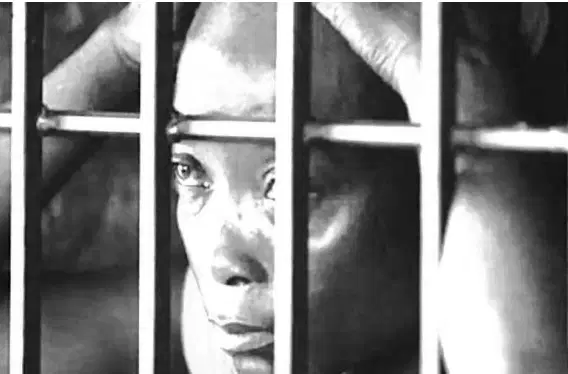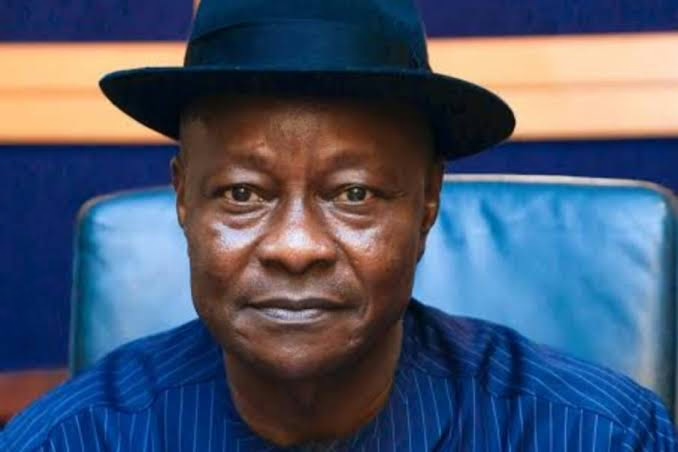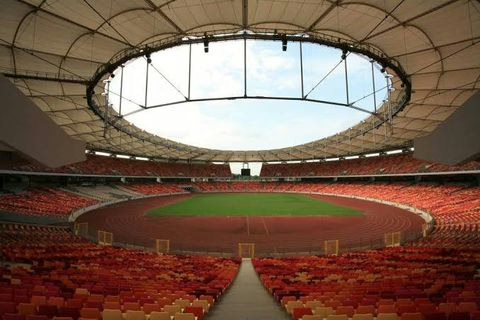Kemi, a female inmate who was arrested in 2020, narrated her ugly experience on how she was unaware of her pregnancy until she was transferred to the Ondo Female Prison on November 24, 2020.
There, she stayed with 16 others in a room she said was “not big”. “The prison has no bed frame, only foam and it is kept on the floor,” she said.
“The foam is like a normal student foam and we each have a blanket to cover ourselves. We were given one uniform each to be worn from Monday to Friday.”
According to her: “No hospital, no dispensary and no sickbay in the prison. All the time I was there, no doctor came to check me and my baby and I was the only person pregnant in the prison. They have no special food for pregnant women. They serve us less than one cup of beans every morning.
“In the afternoon, sometimes they give us ordinary garri to soak without sugar or anything else, or sometimes, eba. And in the evening, garri with soyabean soup that is tasteless and has no oil, fish or meat in it. They normally serve us rice only on Sundays.”
According to data released by the World Prison Brief, WPB, in January 2022, of the 70,797 inmates in Nigerian prisons as of 2022, 69,501 are male while 1,296 are female. Thus, men currently account for 98.2% of the prison population, while women are 1.8%.
From Kirikiri Prison in Lagos, to Agodi in Ibadan, Ijebu-Ode in Ogun State, to Ebonyi, Ondo, Osun, to the east, the south and the north, female inmates in correctional centres experience prisons’ various challenges starting from their mental health, welfare, prison congestion, education, social inclusion, security, finance, budget among others.
Similarly, the well being of the female inmates as well as pregnant and nursing mothers, have also been jeopardised.
Accordingly, the prison warders, officers, and other workers taking care of the female prisons seem to be facing challenges in the line of duty.
At the just-concluded workshop on ‘Gender Responsive Shadow Budget organised by Centre for Gender Economics in Africa, it was revealed that, the number of women going to prison has increased at a much faster rate than that of men. For instance between 2013 – 2016, the percentage increase in the number of women that went to prison was more than that of men, except for 2016. The latest data, 2020, shows that the percentage increase in the number of women that went to prison stood at 8.8% in 2020 from 0.6% in 2016, while that of men dropped to 0.1% from 5.8% in 2016. It has since increased annually, and only dropped slightly in 2020.
The two all-female correctional facilities, Kirikiri Female Prison in Lagos and Numan Old Prison in Adamawa were built to accommodate 611 inmates, but as of 2020, there were 1,238 female inmates in these prisons, which is more than twice the population of female inmates that ought to be there.
Prison overcrowding appears to be a major problem in many African countries, not just Nigeria. It is the same in Cote d’Ivoire’s prison system, Ghana’s prison system and even in Senegal among others.
However, in Nigeria, the majority of these inmates are awaiting trial as reported in Dataphyte’s story that revealed at least 7 out of 10 inmates currently serving time in Nigerian prisons are still awaiting trial.
Inadequate health-care facilities, inadequate correctional facilities, overcrowding, and insufficient sanitary products are some of the age-old challenges confronting prison systems in many African countries.
Besides the fact that the Nigerian prisons are overcrowded, the inmates are also exposed to harsh treatment and life-threatening conditions. Most inmates, particularly women are denied access to necessary healthcare services.
Many female inmates in correctional centres across Nigeria have limited access to basic hygiene and health care products, the United Nations Office on Drugs and Crime, UNODC revealed.
According to article 9 of the Office of the High Commissioner for Human Rights (OHCHR), Basic Principles for the Treatment of Prisoners, all prisoners have the right to health and must have access to the health services available in the country without discrimination, yet, many women in prison like Ms Ogunniyi, are denied their right to health care.
Women, especially those pregnant or with children, have even greater health and hygiene needs and as the population of women in prison grows, it is becoming even more critical to actively figure out access to adequate health care products and nutritious foods for proper rehabilitation and reformation.
The Nigerian Correctional Service Bill, which President Muhammadu Buhari signed into law in 2019, mandates that all inmates, including violent extremists, must receive medical, counseling, spiritual, and psychological services as part of their behavior modification.
A lecturer at the University of Lagos, Development Economist, Dr. Aminat Olohunlana,presenting a paper titled, ‘Gender Analysis of The Federal Government Budget for Nigeria Correctional Services between 2018/2023’, revealed that, most of the policies that are being done are gender neutral, meaning that it does not have a direct concern on female inmates in the Nigerian Correctional Service.
“Government,need to make more specific policies for workers to be able to attend to the concerns of women, women inmate and their children because most pregnant women in the centres have some unequal issues as compared to their counterpart, most of them have issues of stress, trauma, they have issue of menstrual hygiene, there are also issues of them having need for more nutritional benefit as concern to how they feed their infant children in the centre.
“So it is expected that the civil society will continue their advocacy for gender based data and policies recommendations for the government.
It is also expected that NGOs do some of social support for them in managing the post-natal issues and health related challenges that come in handy as in the nature of their dynamics.
It is also noted that for most of these issues, there should be a centre or coordinated correctional centre specified for women so they will have more access to recreational activities because the report shows that most of the women are neglected in recreational activities within the centre”, she said.
Uchenna Idoko, Executive Director, Center for Gender Economics in Africa (CGE Africa), speaking on Guide to Developing a gender responsive shadow budget , said, Gender-responsive budgeting (GRB) is a strategy that promotes the goal of gender equity by allocating specific budgets for both women and men beneficiaries in projects/programmes.
The purpose of GRB is to promote accountability and transparency in fiscal planning; increase gender-responsive participation in the budget process, and advance the gender equity agenda.
Having gender equity in developmental or service delivery programmes requires intentional measures to incorporate a gender perspective in planning and budgeting frameworks and concrete investment in addressing gender gaps.
In GRB, we do not create separate budgets for women or increase spending on women-focused interventions/activities. Rather, GRB seeks to ensure that the collection and allocation of resources are carried out in ways that are effective and contribute to advancing gender equity.
It should be based on in-depth analysis that identifies effective interventions that advance women’s rights. GRB can be applied to any type of budget system at all levels.
According to the CGE’s recommendations, there is need for increased daily feeding allowance, inclusive budgeting for female healthcare (ante-natal and post-natal, other female health related issues, menstrual and reproductive sanitary products)-
“Psycho social support, transportation after discharge , training, court appearances, examinations, medical services, hospital visits, among others.
“The female inmates in correctional centrers also need good water and sanitary services, more female custodial centers with creches and after care services/exclusive rooms for breastfeeding mothers, recreational facilities and items for female inmates
“Inclusive nutritional budgeting to cover infants & breastfeeding mothers, clothing for nursing mothers and their babies. Aftercare services-Women Economic Empowerment, Budgeting and preparation for reintegration into the society- loans, rehabilitation and reintegration of female inmates into the society. As well as NCoS staff training and retraining on gender responsive budgeting and practices”.
In her reaction, the Deputy Controller, Nigerian Correctional Service, National Headquarters, Gender, Hadiza Inna Aminu also admitted that there is need for improvement and well being of the inmates.
“The female inmates are faced with challenges although we have 2 percent of females who commit crime in the country but when it comes to certain amenities, there is room for improvement.
“I believe that the NGO would help unravel some of the hidden issues including provision for ration and gas. The NGO would help us push forwards some of the benefits embedded in the service.
Executive Secretary, NECA’s Network of Entrepreneurial Women, NNEW, Adeniyi Adeyanju, advised the government to increase the budget allocated to the correctional centres across the country and ensure proper appropriation of the funds.
National Association of Catholic, Lagos, Lawyers, Ngozi Ogbolu, said, there should be socio-cultural and medical, professional and psychological training of the inmates before they are released to the society.
“The government should also provide a mid-home for the inmates before they are integrated into the society in order for the family they are going into to be able to receive them and for them to be well prepared to be able to adjust to life despite the stigma. There should be packages, medical treatment, psychological treatment as well as allowances to support them financially on the crafts they learnt.
“Some of the inmates are wrongly accused and they were not allowed to go through trials before becoming prisoners. The government and public sector as well as the NGOs and faith based organizations should come together to integrate these people into the society” she said.
One of the Nigerian Correctional Officers, who spoke on anonymity said, there is need for government to be specific on the budget for the female inmate in order to improve their welfare while they are with us. Considering their special needs.
Representative of Inmates Educational Foundation, Olowofela Shukurat, called for counselors for female inmates in order to engage them in mental health therapy.
A member of the Redeemed Christian Church of God, Apapa Family, Eniola Ayo-Fagbayi, called on all Christians to join in the social work as a mandate by God. “In the Apapa family, we are so passionate about social responsibility and in terms of the Correctional service centres, our duty are to provide basic amenities including bore holes, foodstuffs every Sunday at the Ikoyi prison, even the Kirikiri prison.
We are calling for collaborations from other faith based organizations in order to cover other areas outside Lagos state.
Vanguard













Leave a Reply